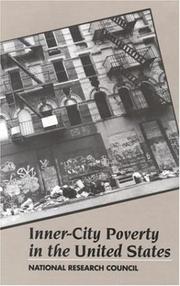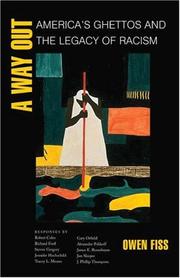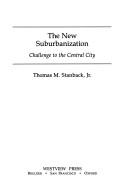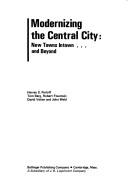| Listing 1 - 10 of 51 | << page >> |
Sort by
|
Book
Abstract | Keywords | Export | Availability | Bookmark
 Loading...
Loading...Choose an application
- Reference Manager
- EndNote
- RefWorks (Direct export to RefWorks)
Social geography --- Inner cities --- Central cities --- Ghettos, Inner city --- Inner city ghettos --- Inner city problems --- Zones of transitions --- Cities and towns --- Urban cores
Book
ISBN: 9780813345031 9780429496516 9780429987229 9780367318512 Year: 2012 Publisher: Boulder Westview Press
Abstract | Keywords | Export | Availability | Bookmark
 Loading...
Loading...Choose an application
- Reference Manager
- EndNote
- RefWorks (Direct export to RefWorks)
A cutting-edge collection of original essays from leading scholars examining the contemporary state of the ghetto in all its forms
Inner cities --- Sociology [Urban ] --- Sociology, Urban --- Urban sociology --- Cities and towns --- Central cities --- Ghettos, Inner city --- Inner city ghettos --- Inner city problems --- Zones of transitions --- Urban cores
Book
ISBN: 3764379634 Year: 2006 Publisher: Basel : Birkhauser,
Abstract | Keywords | Export | Availability | Bookmark
 Loading...
Loading...Choose an application
- Reference Manager
- EndNote
- RefWorks (Direct export to RefWorks)
Die hier versammelten Essays gelten dem Zusammenhang von sozialer und ethnischer Ausgrenzung und staatlicher Politik in den Metropolen zu Beginn des 21. Jahrhunderts. Die aus einer erfahrungsgestützten Perspektive geschriebenen Beiträge diagnostizieren die sich überall abzeichnenden Formen städtischer Armut und Gewalt in den entwickelten Gesellschaften des reichen Westens. Der Autor arbeitet mit einem soziologischen Konzept des Ghettos als Instrument ethnischer Kontrolle und Einschließung. Er zeigt, wie sich Staaten zunehmend von der Idee und der Praxis der sozialen Wohlfahrt trennen und zur Ausgrenzung der «sozial Abgehängten» übergehen. Essays in diesem Band sind unter anderem «Städtische Ausgrenzung im 21. Jahrhundert» und «Die Bestrafung der Armut und der Aufstieg des Neoliberalismus».
Inner cities. --- Sociology, Urban. --- Urban sociology --- Cities and towns --- Central cities --- Ghettos, Inner city --- Inner city ghettos --- Inner city problems --- Zones of transitions --- Urban cores
Book
ISBN: 906275564X Year: 1989 Publisher: Delft Delft university press
Abstract | Keywords | Export | Availability | Bookmark
 Loading...
Loading...Choose an application
- Reference Manager
- EndNote
- RefWorks (Direct export to RefWorks)
Housing --- Inner cities --- Central cities --- Ghettos, Inner city --- Inner city ghettos --- Inner city problems --- Zones of transitions --- Cities and towns --- Urban cores --- Sociology of environment --- Netherlands

ISBN: 0309042798 9786610212378 1280212373 0309543495 0585144486 9780585144481 9780309042796 9781280212376 6610212376 9780309543491 Year: 1990 Publisher: Washington, D.C. National Academy Press
Abstract | Keywords | Export | Availability | Bookmark
 Loading...
Loading...Choose an application
- Reference Manager
- EndNote
- RefWorks (Direct export to RefWorks)
Documents the growth of concentrated poverty in central cities of the United States and examines what is known about its causes and effects. This volume is useful for policymakers, program administrators, researchers studying urban poverty issues, faculty, and students.
Urban poor --- Inner cities --- Government policy --- Central cities --- Ghettos, Inner city --- Inner city ghettos --- Inner city problems --- Zones of transitions --- Cities and towns --- Urban cores --- City dwellers --- Poor --- United States


ISBN: 1282158074 9786612158070 1400825512 9781400825516 9780691088815 0691088810 0691088810 Year: 2009 Publisher: Princeton, NJ
Abstract | Keywords | Export | Availability | Bookmark
 Loading...
Loading...Choose an application
- Reference Manager
- EndNote
- RefWorks (Direct export to RefWorks)
After decades of hand-wringing and well-intentioned efforts to improve inner cities, ghettos remain places of degrading poverty with few jobs, much crime, failing schools, and dilapidated housing. Stepping around fruitless arguments over whether or not ghettos are dysfunctional communities that exacerbate poverty, and beyond modest proposals to ameliorate their problems, one of America's leading experts on civil rights gives us a stunning but commonsensical solution: give residents the means to leave. Inner cities, writes Owen Fiss, are structures of subordination. The only way to end the poverty they transmit across generations is to help people move out of them--and into neighborhoods with higher employment rates and decent schools. Based on programs tried successfully in Chicago and elsewhere, Fiss's proposal is for a provocative national policy initiative that would give inner-city residents rent vouchers so they can move to better neighborhoods. This would end at last the informal segregation, by race and income, of our metropolitan regions. Given the government's role in creating and maintaining segregation, Fiss argues, justice demands no less than such sweeping federal action. To sample the heated controversy that Fiss's ideas will ignite, the book includes ten responses from scholars, journalists, and practicing lawyers. Some endorse Fiss's proposal in general terms but take issue with particulars. Others concur with his diagnosis of the problem but argue that his policy response is wrongheaded. Still others accuse Fiss of underestimating the internal strength of inner-city communities as well as the hostility of white suburbs. Fiss's bold views should set off a debate that will help shape urban social policy into the foreseeable future. It is indispensable reading for anyone interested in social justice, domestic policy, or the fate of our cities.
Occupational mobility --- Urban poor --- Inner cities --- Social problems --- City dwellers --- Poor --- Central cities --- Ghettos, Inner city --- Inner city ghettos --- Inner city problems --- Zones of transitions --- Cities and towns --- Urban cores --- Government policy
Book
ISBN: 067497462X 0674974646 9780674974647 9780674970502 0674970500 9780674984073 0674984072 Year: 2017 Publisher: Cambridge, MA
Abstract | Keywords | Export | Availability | Bookmark
 Loading...
Loading...Choose an application
- Reference Manager
- EndNote
- RefWorks (Direct export to RefWorks)
Why do American ghettos persist? Decades after Moynihan’s report on the black family and the Kerner Commission’s investigations of urban disorders, deeply disadvantaged black communities remain a disturbing reality. Scholars and commentators today often identify some factor—such as single motherhood, joblessness, or violent street crime—as the key to solving the problem and recommend policies accordingly. But, Tommie Shelby argues, these attempts to “fix” ghettos or “help” their poor inhabitants ignore fundamental questions of justice and fail to see the urban poor as moral agents responding to injustice. Drawing on liberal-egalitarian philosophy and informed by leading social science research, Dark Ghettos examines the thorny questions of political morality raised by ghettos. Should government foster integrated neighborhoods? If a “culture of poverty” exists, what interventions are justified? Should single parenthood be avoided or deterred? Is voluntary nonwork or crime an acceptable mode of dissent? How should a criminal justice system treat the oppressed? Shelby offers practical answers, framed in terms of what justice requires of both a government and its citizens, and he views the oppressed as allies in the fight for a society that warrants everyone’s allegiance. “The ghetto is not ‘their’ problem but ours, privileged and disadvantaged alike,” Shelby writes. The existence of ghettos is evidence that our society is marred by structural injustices that demand immediate rectification. Dark Ghettos advances a social vision and political ethics that calls for putting the abolition of ghettos at the center of reform.
Inner cities --- Social justice --- Racism in public welfare --- African Americans --- Central cities --- Ghettos, Inner city --- Inner city ghettos --- Inner city problems --- Zones of transitions --- Cities and towns --- Urban cores --- Welfare racism --- Public welfare --- Social conditions. --- Government policy

ISBN: 0813380510 Year: 1991 Publisher: Boulder Westview
Abstract | Keywords | Export | Availability | Bookmark
 Loading...
Loading...Choose an application
- Reference Manager
- EndNote
- RefWorks (Direct export to RefWorks)
Economic geography --- United States --- Inner cities --- -Metropolitan areas --- -Suburbs --- -Outskirts of cities --- Suburban areas --- Suburbia --- Cities and towns --- City planning --- Metropolitan areas --- Conurbations --- MAs (Metropolitan areas) --- Metropolitan statistical areas --- Urban areas --- Central cities --- Ghettos, Inner city --- Inner city ghettos --- Inner city problems --- Zones of transitions --- Urban cores --- Economic aspects --- -Growth --- -Economic aspects --- -Inner cities --- Suburbs --- Outskirts of cities --- Growth --- United States of America
Book
ISBN: 0521277116 Year: 1989 Publisher: Cambridge Cambridge University press
Abstract | Keywords | Export | Availability | Bookmark
 Loading...
Loading...Choose an application
- Reference Manager
- EndNote
- RefWorks (Direct export to RefWorks)
USA -- 930.32 --- IMMIGRANTEN -- 930.32 --- Immigrants --- Inner cities --- Slums --- Urban minorities --- Urban poor --- City dwellers --- Minorities --- Poor --- Slum clearance --- Housing --- Central cities --- Ghettos, Inner city --- Inner city ghettos --- Inner city problems --- Zones of transitions --- Cities and towns --- Urban cores --- History --- United States --- Social conditions

ISBN: 0884104141 Year: 1975 Publisher: Cambridge Ballinger
Abstract | Keywords | Export | Availability | Bookmark
 Loading...
Loading...Choose an application
- Reference Manager
- EndNote
- RefWorks (Direct export to RefWorks)
Inner cities --- -Urban renewal --- -Model cities --- Renewal, Urban --- Urban redevelopment --- Urban renewal projects --- City planning --- Land use, Urban --- Urban policy --- Central cities --- Ghettos, Inner city --- Inner city ghettos --- Inner city problems --- Zones of transitions --- Cities and towns --- Urban cores --- Urban renewal --- United States. --- -Inner cities --- United States
| Listing 1 - 10 of 51 | << page >> |
Sort by
|

 Search
Search Feedback
Feedback About UniCat
About UniCat  Help
Help News
News